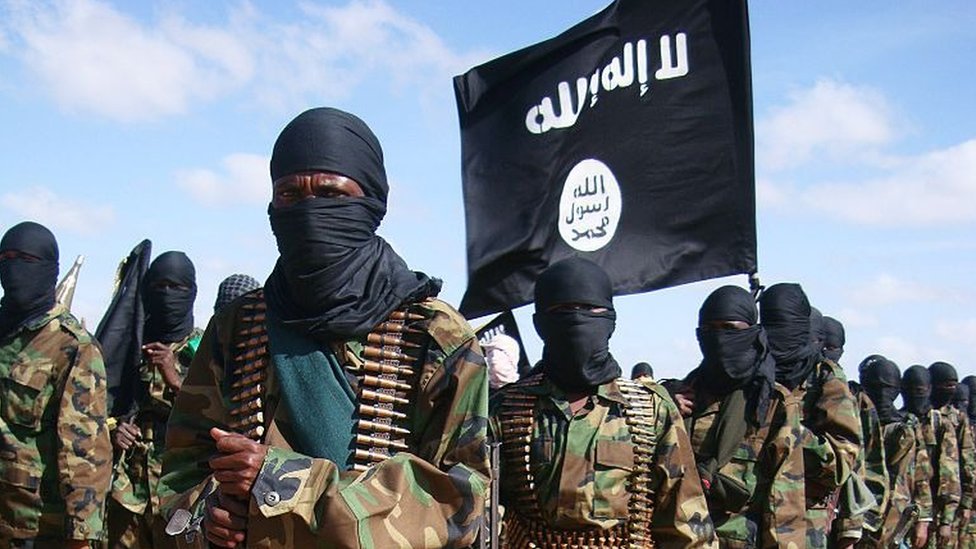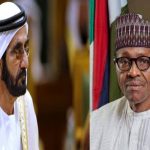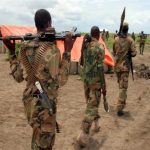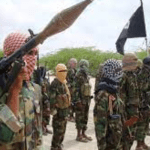The interior ministry in Kenya has disclosed that the Kenyan government has frozen the asssets of 9 people it accused of being financiers of the Somali terror group, Al- Shabab.
It said the move was part of its renewed counter-terrorism efforts aimed at tackling “ domestic terrorists”.
In a statement, Internal Security Minister Fred Matiang’i said the freezing of assets of the nine Kenyans would ensure they no longer financed al-Shabab group “within our borders”.
He also warned that the group was recruiting, radicalising and planting operatives among civilians “to advance their agenda of extremism and terrorism”.

The announcement came as Kenya’s President Uhuru Kenyatta told global leaders that the Covid-19 pandemic had heightened potential for terrorist acts, worsened the refugee crisis and led to the proliferation of small arms and light weapons in the Horn of Africa region.
Kenya has faced numerous attacks from al-Shabab since deploying its troops to Somalia in 2011 to combat the group.
The president was speaking during a virtual meeting of the Aqaba Process on Covid-19 convened by King Abdullah II of Jordan that was also attended by Canadian Prime Minister Justin Trudeau, President Rodrigo Duterte of the Philippines and UN Secretary General António Guterres to discuss the Covid-19 pandemic and global security.
The interior ministry in Kenya has disclosed that the Kenyan government has frozen the asssets of 9 people it accused of being financiers of the Somali terror group, Al- Shabab.
It said the move was part of its renewed counter-terrorism efforts aimed at tackling “ domestic terrorists”.
In a statement, Internal Security Minister Fred Matiang’i said the freezing of assets of the nine Kenyans would ensure they no longer financed al-Shabab group “within our borders”.
He also warned that the group was recruiting, radicalising and planting operatives among civilians “to advance their agenda of extremism and terrorism”.

The announcement came as Kenya’s President Uhuru Kenyatta told global leaders that the Covid-19 pandemic had heightened potential for terrorist acts, worsened the refugee crisis and led to the proliferation of small arms and light weapons in the Horn of Africa region.
Kenya has faced numerous attacks from al-Shabab since deploying its troops to Somalia in 2011 to combat the group.
The president was speaking during a virtual meeting of the Aqaba Process on Covid-19 convened by King Abdullah II of Jordan that was also attended by Canadian Prime Minister Justin Trudeau, President Rodrigo Duterte of the Philippines and UN Secretary General António Guterres to discuss the Covid-19 pandemic and global security.
The interior ministry in Kenya has disclosed that the Kenyan government has frozen the asssets of 9 people it accused of being financiers of the Somali terror group, Al- Shabab.
It said the move was part of its renewed counter-terrorism efforts aimed at tackling “ domestic terrorists”.
In a statement, Internal Security Minister Fred Matiang’i said the freezing of assets of the nine Kenyans would ensure they no longer financed al-Shabab group “within our borders”.
He also warned that the group was recruiting, radicalising and planting operatives among civilians “to advance their agenda of extremism and terrorism”.

The announcement came as Kenya’s President Uhuru Kenyatta told global leaders that the Covid-19 pandemic had heightened potential for terrorist acts, worsened the refugee crisis and led to the proliferation of small arms and light weapons in the Horn of Africa region.
Kenya has faced numerous attacks from al-Shabab since deploying its troops to Somalia in 2011 to combat the group.
The president was speaking during a virtual meeting of the Aqaba Process on Covid-19 convened by King Abdullah II of Jordan that was also attended by Canadian Prime Minister Justin Trudeau, President Rodrigo Duterte of the Philippines and UN Secretary General António Guterres to discuss the Covid-19 pandemic and global security.
The interior ministry in Kenya has disclosed that the Kenyan government has frozen the asssets of 9 people it accused of being financiers of the Somali terror group, Al- Shabab.
It said the move was part of its renewed counter-terrorism efforts aimed at tackling “ domestic terrorists”.
In a statement, Internal Security Minister Fred Matiang’i said the freezing of assets of the nine Kenyans would ensure they no longer financed al-Shabab group “within our borders”.
He also warned that the group was recruiting, radicalising and planting operatives among civilians “to advance their agenda of extremism and terrorism”.

The announcement came as Kenya’s President Uhuru Kenyatta told global leaders that the Covid-19 pandemic had heightened potential for terrorist acts, worsened the refugee crisis and led to the proliferation of small arms and light weapons in the Horn of Africa region.
Kenya has faced numerous attacks from al-Shabab since deploying its troops to Somalia in 2011 to combat the group.
The president was speaking during a virtual meeting of the Aqaba Process on Covid-19 convened by King Abdullah II of Jordan that was also attended by Canadian Prime Minister Justin Trudeau, President Rodrigo Duterte of the Philippines and UN Secretary General António Guterres to discuss the Covid-19 pandemic and global security.
The interior ministry in Kenya has disclosed that the Kenyan government has frozen the asssets of 9 people it accused of being financiers of the Somali terror group, Al- Shabab.
It said the move was part of its renewed counter-terrorism efforts aimed at tackling “ domestic terrorists”.
In a statement, Internal Security Minister Fred Matiang’i said the freezing of assets of the nine Kenyans would ensure they no longer financed al-Shabab group “within our borders”.
He also warned that the group was recruiting, radicalising and planting operatives among civilians “to advance their agenda of extremism and terrorism”.

The announcement came as Kenya’s President Uhuru Kenyatta told global leaders that the Covid-19 pandemic had heightened potential for terrorist acts, worsened the refugee crisis and led to the proliferation of small arms and light weapons in the Horn of Africa region.
Kenya has faced numerous attacks from al-Shabab since deploying its troops to Somalia in 2011 to combat the group.
The president was speaking during a virtual meeting of the Aqaba Process on Covid-19 convened by King Abdullah II of Jordan that was also attended by Canadian Prime Minister Justin Trudeau, President Rodrigo Duterte of the Philippines and UN Secretary General António Guterres to discuss the Covid-19 pandemic and global security.
The interior ministry in Kenya has disclosed that the Kenyan government has frozen the asssets of 9 people it accused of being financiers of the Somali terror group, Al- Shabab.
It said the move was part of its renewed counter-terrorism efforts aimed at tackling “ domestic terrorists”.
In a statement, Internal Security Minister Fred Matiang’i said the freezing of assets of the nine Kenyans would ensure they no longer financed al-Shabab group “within our borders”.
He also warned that the group was recruiting, radicalising and planting operatives among civilians “to advance their agenda of extremism and terrorism”.

The announcement came as Kenya’s President Uhuru Kenyatta told global leaders that the Covid-19 pandemic had heightened potential for terrorist acts, worsened the refugee crisis and led to the proliferation of small arms and light weapons in the Horn of Africa region.
Kenya has faced numerous attacks from al-Shabab since deploying its troops to Somalia in 2011 to combat the group.
The president was speaking during a virtual meeting of the Aqaba Process on Covid-19 convened by King Abdullah II of Jordan that was also attended by Canadian Prime Minister Justin Trudeau, President Rodrigo Duterte of the Philippines and UN Secretary General António Guterres to discuss the Covid-19 pandemic and global security.
The interior ministry in Kenya has disclosed that the Kenyan government has frozen the asssets of 9 people it accused of being financiers of the Somali terror group, Al- Shabab.
It said the move was part of its renewed counter-terrorism efforts aimed at tackling “ domestic terrorists”.
In a statement, Internal Security Minister Fred Matiang’i said the freezing of assets of the nine Kenyans would ensure they no longer financed al-Shabab group “within our borders”.
He also warned that the group was recruiting, radicalising and planting operatives among civilians “to advance their agenda of extremism and terrorism”.

The announcement came as Kenya’s President Uhuru Kenyatta told global leaders that the Covid-19 pandemic had heightened potential for terrorist acts, worsened the refugee crisis and led to the proliferation of small arms and light weapons in the Horn of Africa region.
Kenya has faced numerous attacks from al-Shabab since deploying its troops to Somalia in 2011 to combat the group.
The president was speaking during a virtual meeting of the Aqaba Process on Covid-19 convened by King Abdullah II of Jordan that was also attended by Canadian Prime Minister Justin Trudeau, President Rodrigo Duterte of the Philippines and UN Secretary General António Guterres to discuss the Covid-19 pandemic and global security.
The interior ministry in Kenya has disclosed that the Kenyan government has frozen the asssets of 9 people it accused of being financiers of the Somali terror group, Al- Shabab.
It said the move was part of its renewed counter-terrorism efforts aimed at tackling “ domestic terrorists”.
In a statement, Internal Security Minister Fred Matiang’i said the freezing of assets of the nine Kenyans would ensure they no longer financed al-Shabab group “within our borders”.
He also warned that the group was recruiting, radicalising and planting operatives among civilians “to advance their agenda of extremism and terrorism”.

The announcement came as Kenya’s President Uhuru Kenyatta told global leaders that the Covid-19 pandemic had heightened potential for terrorist acts, worsened the refugee crisis and led to the proliferation of small arms and light weapons in the Horn of Africa region.
Kenya has faced numerous attacks from al-Shabab since deploying its troops to Somalia in 2011 to combat the group.
The president was speaking during a virtual meeting of the Aqaba Process on Covid-19 convened by King Abdullah II of Jordan that was also attended by Canadian Prime Minister Justin Trudeau, President Rodrigo Duterte of the Philippines and UN Secretary General António Guterres to discuss the Covid-19 pandemic and global security.














